Discover the Colorful Markets of Marrakech, Morocco
Nov 13, 2024 | By Piz za
Marrakech, often referred to as the “Ocher City,” is a vibrant tapestry of cultures, colors, and traditions. At the heart of this enchanting city lies a network of bustling markets, or souks, that have been the lifeblood of Marrakech for centuries. These souks are not merely places of commerce; they are a sensory adventure that invites visitors to immerse themselves in the rich history and culture of Morocco.
Historical Context
The souks of Marrakech carry a rich history that reaches back over a thousand years to the 11th century. It was during this period that the Almoravids, a Berber dynasty, established Marrakech as a vital trading hub in North Africa. The city’s strategic location made it a nexus for merchants, craftsmen, and travelers, enabling it to become one of the region’s premier destinations for commerce and cultural exchange. Over time, these souks became integral to both the economy and the social fabric of Marrakech, establishing a legacy of trade that persists to this day.
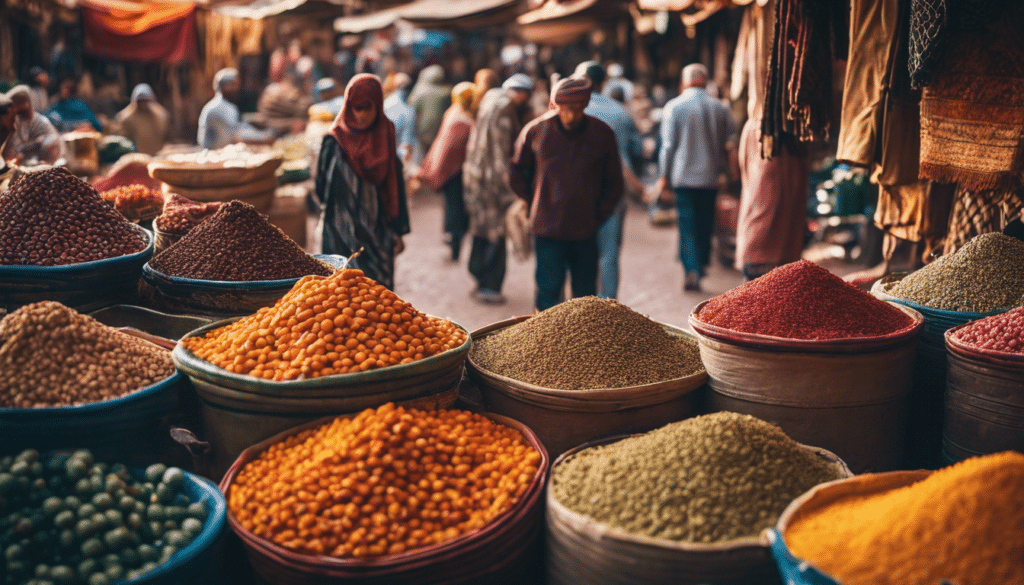
Throughout the years, the souks have weathered numerous historical transitions, including changes in ruling dynasties and cultural influences from distant lands brought by traders and explorers. As you explore the winding alleyways and vibrant stalls, it’s easy to imagine the historical layers that form the foundation of this unique marketplace. The architecture, layout, and even the traditions of haggling reflect centuries of evolution, mirroring the city’s journey from its origins as a bustling trade center to a modern cultural landmark that attracts visitors from around the world.
The Souks: A Sensory Experience
The souks of Marrakech are an explosion of sensory delights, a maze filled with an array of sights, sounds, and scents that captivate visitors. Located close to the bustling Jemaa el-Fna square, these markets are not just shopping destinations; they are immersive experiences that offer a unique glimpse into Moroccan culture. Here, the term “souk” refers to more than just a market—it represents a tapestry of Moroccan life, where every corner offers something new, from intricately designed pottery to the fragrances of exotic spices.
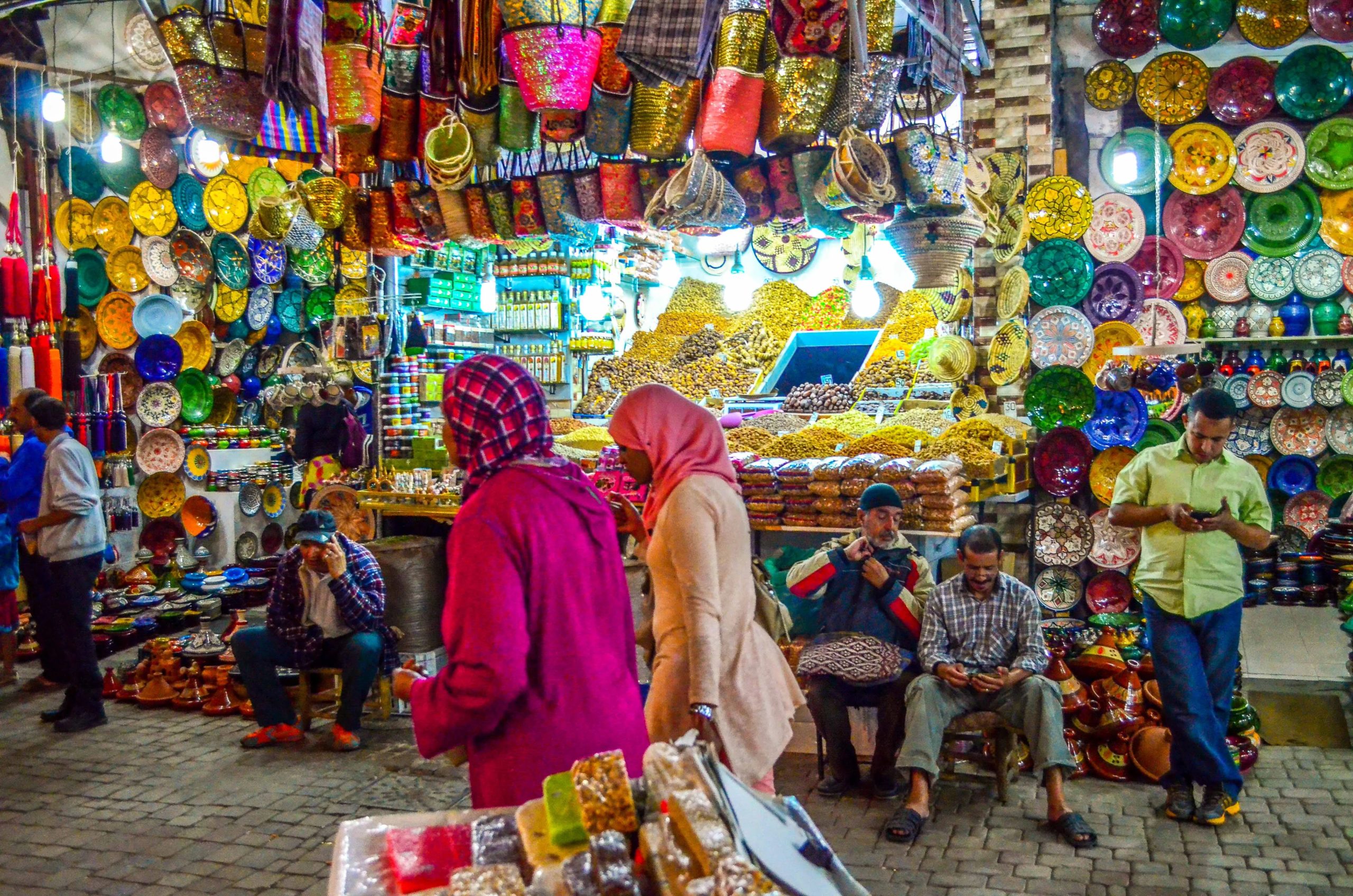
Walking through the souks is a journey for the senses. The smell of freshly ground spices mingles with the scent of leather and perfumed oils, while vibrant colors from handwoven rugs and elaborate lanterns catch the eye. Street musicians and vendors calling out prices add a rhythmic energy to the experience. This sensory intensity, paired with the labyrinthine layout, turns a visit into an adventure. Every stall presents an opportunity to discover something unexpected, making the souks a must-visit for anyone seeking to truly immerse themselves in the cultural pulse of Marrakech.
Souk Semmarine
One of the most renowned sections of the souks is Souk Semmarine, an area celebrated for its diverse and vibrant offerings. Just a short walk from Jemaa el-Fna, Souk Semmarine is a must-visit for anyone looking to experience the lively heart of Marrakech. Here, the aisles are lined with stalls selling colorful fabrics, traditional clothing, aromatic spices, and an array of antiques that tell stories of Morocco’s history and artistic heritage. The market is a bustling hub that perfectly captures the city’s fusion of old-world charm and contemporary flair.

The vibrant energy of Souk Semmarine is palpable, with visitors and locals alike weaving through the narrow lanes, each filled with treasures and trinkets that highlight the best of Moroccan craftsmanship. From intricately embroidered textiles to delicately crafted jewelry, every piece on display reflects a part of Morocco’s artistic soul. Visiting this market is not just about shopping; it’s an opportunity to connect with artisans, learn about Moroccan culture, and appreciate the blend of tradition and innovation that characterizes Marrakech.
The Artisans and Their Crafts
Marrakech’s souks are a showcase for the city’s skilled artisans, many of whom have honed their crafts over multiple generations. The items sold here are often handmade, each piece reflecting hours of meticulous work and a deep pride in the traditional methods passed down through families. Visitors can find an impressive variety of handmade goods, including lanterns, leather bags, rugs, and intricate jewelry. These items are not merely souvenirs—they are artifacts that offer a glimpse into the rich cultural heritage of Morocco.
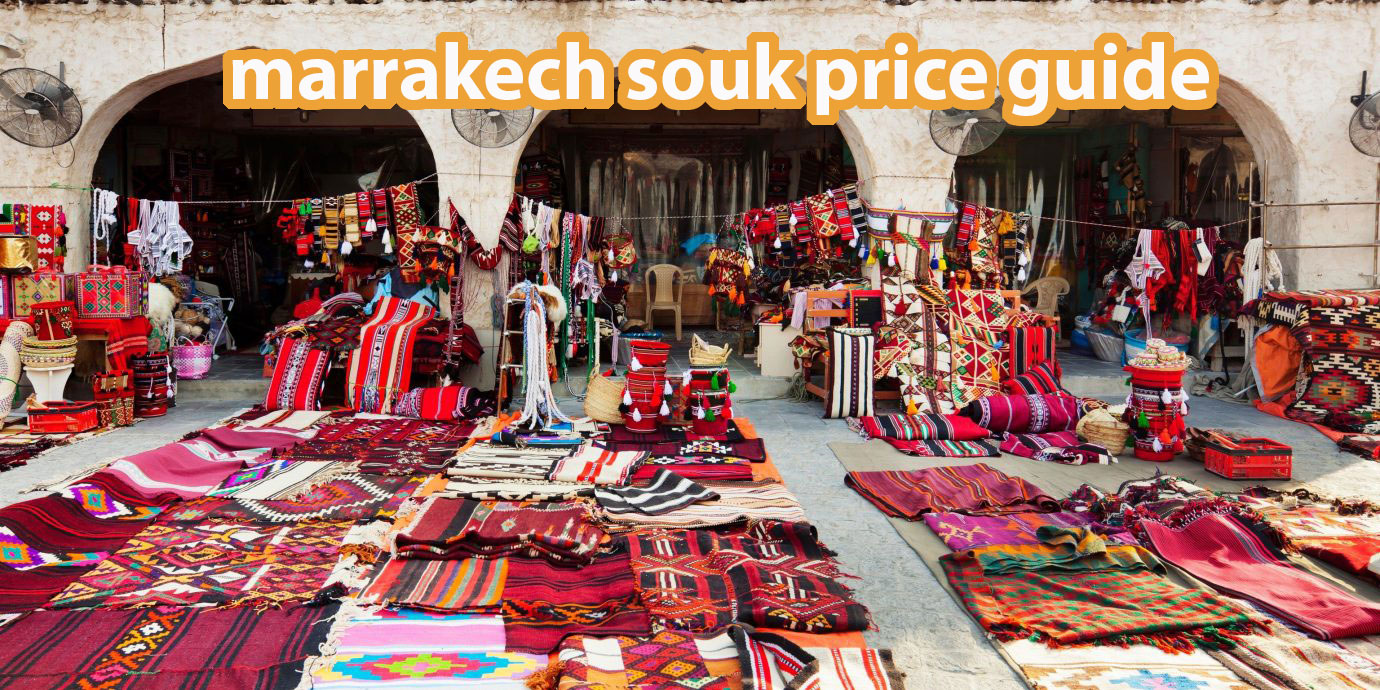
Among the most popular items are the colorful Moroccan shoes, known as “babouches,” and the iconic poufs, which are often made from leather and stitched with intricate patterns. These artisanal goods, crafted with great care and attention to detail, are not only functional but also serve as beautiful reminders of Moroccan craftsmanship. By purchasing these items, visitors not only acquire unique and lasting mementos but also support the artisanal community that sustains this centuries-old tradition.
Navigating the Markets
For first-time visitors, navigating Marrakech’s extensive souks can be both thrilling and overwhelming. The markets stretch endlessly, with maze-like alleyways that twist and turn, each revealing new treasures to explore. Most visitors start their journey from Jemaa el-Fna, where three main entrances lead into the heart of the souks. At the edges of the markets, goods are often mixed together, providing a visually exciting and varied shopping experience that’s unlike any other. Exploring these alleys with a sense of adventure allows you to get lost in the vibrant atmosphere and embrace the unknown.
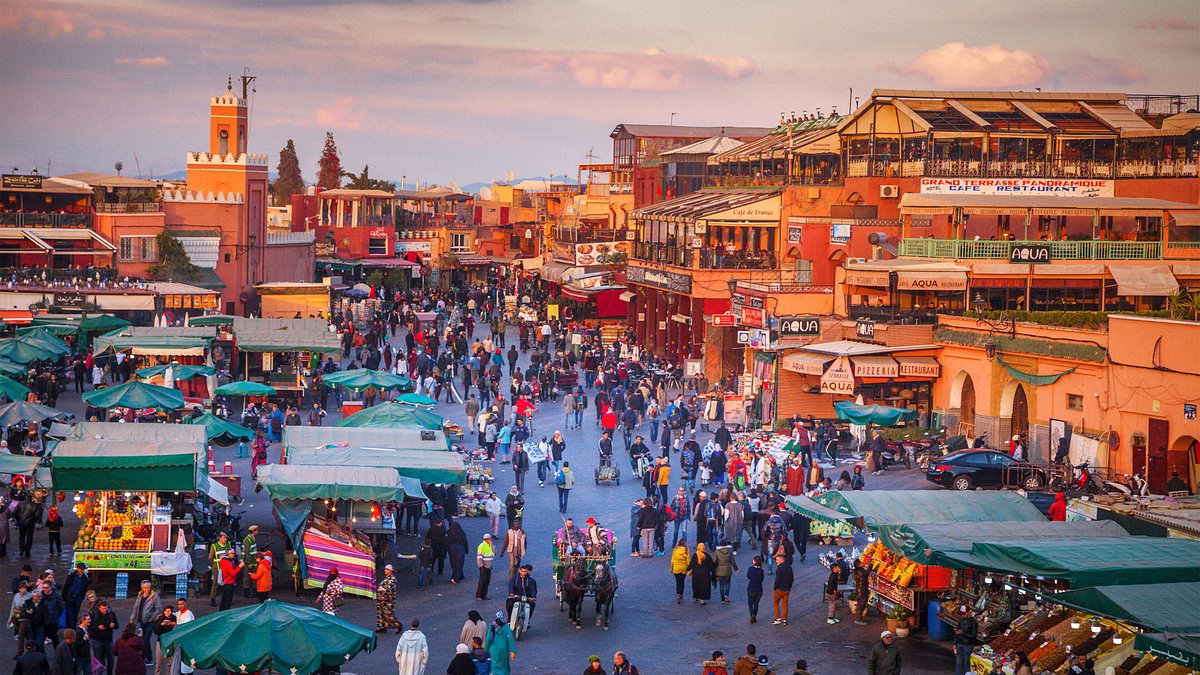
Haggling is an essential part of the shopping experience in Marrakech, and it’s seen as a respectful and enjoyable exchange between buyer and seller. Vendors expect customers to negotiate, and the process is often accompanied by smiles, laughter, and a bit of friendly banter. By engaging in haggling, visitors can enjoy an authentic cultural exchange that goes beyond a simple transaction. It’s a chance to learn more about Moroccan customs, practice bargaining skills, and leave with cherished items that carry stories of their own.
Cultural Significance
The souks of Marrakech hold deep cultural significance, serving as a living testament to the diverse influences that have shaped Moroccan society over the centuries. More than just places of commerce, these markets are social and cultural hubs where locals and tourists converge. The souks provide a space for community interaction and cultural exchange, with vendors often eager to share the stories behind their crafts, allowing visitors to understand and appreciate the unique Moroccan way of life.
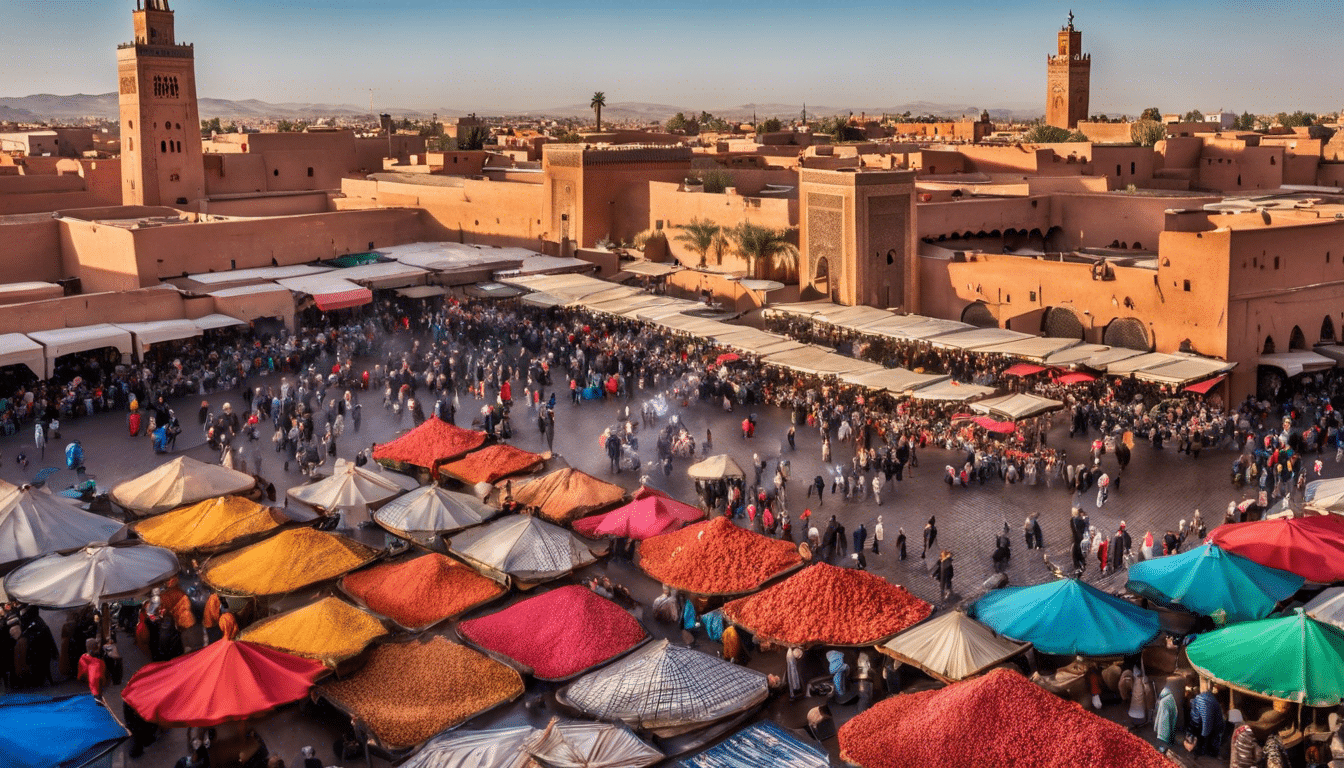
Exploring the souks offers a glimpse into the heart of Moroccan culture, where ancient traditions and modern influences harmoniously coexist. The streets are alive with activity, with artisans at work, musicians entertaining crowds, and vendors engaging with customers from around the globe. This lively, colorful world embodies the soul of Marrakech and leaves visitors with unforgettable memories of a culture that values artistry, resilience, and hospitality.
Top Attractions in Marrakech
Marrakech, with its enchanting souks and rich cultural heritage, offers much more for the curious traveler. Beyond the bustling markets, the city is home to several iconic landmarks and serene spots that highlight its diverse beauty and historical significance. Here’s a look at some must-visit destinations for a truly immersive experience in the Ocher City.
1. Koutoubia Mosque
Located near Jemaa el-Fna, this majestic mosque is one of Marrakech’s most famous landmarks. Its towering minaret, visible from across the city, is a symbol of traditional Moroccan architecture and religious devotion.
2. Majorelle Garden
A peaceful oasis in the heart of Marrakech, this vibrant garden, created by French painter Jacques Majorelle and later restored by Yves Saint Laurent, features exotic plants, art deco buildings, and a stunning blue hue known as “Majorelle blue.”
3. Bahia Palace
Step into a world of intricate mosaics, lavish gardens, and architectural splendor. The Bahia Palace offers a glimpse into Moroccan royalty and is a masterpiece of traditional Islamic and Moroccan design.
4. Saadian Tombs
Rediscovered in 1917, the Saadian Tombs house the remains of members of the Saadian dynasty. The tombs are ornately decorated with carved cedar wood and colorful tile mosaics, showcasing the splendor of Morocco’s royal heritage.
5. El Badi Palace
Although now mostly in ruins, the El Badi Palace remains an iconic historical site. Once a magnificent structure adorned with Italian marble and Sudanese gold, it now hosts festivals and provides a unique glimpse into Marrakech’s glorious past.
Conclusion
The markets of Marrakech are a testament to the city’s enduring charm and cultural richness. As you wander through the souks, you are not just shopping; you are participating in a centuries-old tradition that continues to thrive in the heart of Morocco. Whether you are seeking hidden gems or timeless treasures, the souks of Marrakech promise an enchanting journey into the soul of this captivating city.
Related Blogs

India vs New Zealand: A Traveler’s Perspective on Two Unique Destinations
India vs New Zealand are two destinations that offer contrasting yet equally mesmerizing experiences. India vs New Zealand comparisons often highlight India’s centuries-old traditions, bustling bazaars, and architectural marvels versus New Zealand’s breathtaking natural landscapes and adrenaline-pumping adventures. Whether you’re a culture enthusiast, nature lover, or thrill-seeker, this guide will help you explore the best […]

Barbastro Barcelona: A Journey Through Spain’s Hidden Gems
Spain is a treasure trove of culture, history, and breathtaking landscapes. Two destinations that encapsulate the country’s charm are Barbastro Barcelona. While Barcelona is renowned for its vibrant city life and iconic architecture, Barbastro offers a quieter, more traditional Spanish experience nestled in the heart of the Somontano wine region. Together, they create the perfect […]

The Complete Guide to the Carry On Cast: Past, Present, and Future
The Carry On films stand as a cornerstone of British cinema, delivering decades of laughter and unforgettable characters. This iconic comedy franchise, spanning over 30 years, combined slapstick humor, clever wordplay, and a talented ensemble cast that became household names. This guide explores the history of the Carry On cast, their contributions to the franchise, […]

Exploring Austria’s Iconic Opera Houses
Austria, a nation steeped in a rich cultural heritage, stands as a beacon of classical music and artistic excellence. Among its most revered cultural institutions are its opera houses, which serve as both architectural marvels and stages for world-class performances. This report delves into the history, architecture, notable performances, and cultural significance of Austria’s iconic […]

Exploring the Distinctive Andean Music of Bolivia
The Andean music of Bolivia is a vibrant and integral part of the country’s cultural tapestry, deeply rooted in the traditions and spiritual practices of the Andean peoples. This genre of music is not only a form of artistic expression but also a medium through which the stories, legends, and historical narratives of the Aymara […]

Learning About the Carnival Culture in Rio de Janeiro, Brazil
The Rio de Janeiro Carnival, often heralded as the world’s largest and most famous carnival celebration, is a vibrant showcase of Brazilian culture, history, and community spirit. This annual event, which draws millions of participants and spectators from around the globe, is a testament to Brazil’s rich cultural heritage and its capacity for joyous celebration. […]

Mastering Mozzarella: A Taste of Italy
Mozzarella, a semi-soft cheese originating from Italy, is cherished for its creamy texture and mild flavor. Traditionally crafted from buffalo milk, it also finds a popular variant made from cow’s milk. This cheese is not just a culinary staple but a cultural icon, deeply embedded in Italian society and cuisine. Its high moisture content contributes […]

Discovering the Art of Calligraphy in South Korea
Korean calligraphy, known as “Seoye” (서예), stands as a testament to the rich cultural heritage and artistic expression of Korea. This ancient art form, which involves the artistic writing of both Hanja (Chinese logographs) and Hangul (the Korean native alphabet), transcends mere communication to become a profound medium of aesthetic and spiritual expression. As we […]

Scotland’s Tartan: A History of Highland Dress
Tartan, with its vibrant patterns and historical richness, is one of Scotland’s most iconic symbols. It is inextricably linked to the kilt and the national dress of Scotland, embodying both cultural heritage and identity. This detailed report delves into the origins, evolution, and cultural significance of tartan and Highland dress, exploring how this textile has […]

Tribal Arts of Papua New Guinea: A Unique Heritage
Papua New Guinea (PNG) is a nation marked by its remarkable cultural diversity, with over 800 distinct tribes, each possessing its own language and customs. This diversity is vividly expressed through the tribal arts, which are not only a testament to the rich heritage of the indigenous people but also serve as a living tapestry […]

